Supplements That Reduce Nighttime Awakenings
💤 Introduction: When Sleep Won’t Stay Still
You fall asleep easily enough… but then it happens.
2:00 a.m. — eyes snap open.
3:30 a.m. — brain starts racing.
5:00 a.m. — too late to sleep, too early to function.
If that sounds familiar, you’re not alone. Nighttime awakenings are one of the most common sleep complaints in adults. They’re often caused by blood sugar drops, cortisol spikes, dehydration, or neurotransmitter imbalances — all of which can be influenced by nutrition and lifestyle.
The good news? Certain natural supplements can target these biological disruptions, helping you stay asleep longer and restore deep, continuous rest 💤.
In this guide, you’ll learn:
Why your body wakes up at night
How nutrients and herbs can stabilize your sleep cycles
The best supplements for staying asleep naturally
Practical bedtime combinations and rituals that work
Let’s dive in. 🌙
Looking for supplements for This? Click here.
🧠 Part 1: Why You Wake Up in the Middle of the Night
Before you start supplementing, it’s important to understand what’s waking you up.
⚡ 1️⃣ Blood Sugar Fluctuations
When blood glucose drops during the night, your body releases adrenaline and cortisol to stabilize it — which can cause you to jolt awake suddenly.
Signs:
Waking around 2–3 a.m.
Racing heart or anxious thoughts
Trouble falling back asleep
Fix: Eat a protein-rich evening snack or use supplements that stabilize glucose and cortisol (e.g., magnesium, ashwagandha, chromium).
🌡️ 2️⃣ Cortisol Rhythm Disruption
Cortisol should drop at night and rise near sunrise. But chronic stress, inflammation, or late-night screen time can cause nocturnal cortisol spikes, keeping your body “on alert.”
Fix: Adaptogens like ashwagandha and phosphatidylserine help re-establish cortisol rhythm.
💧 3️⃣ Electrolyte Imbalance and Dehydration
Even mild dehydration can increase heart rate and blood pressure during sleep. Low magnesium or potassium may also trigger muscle cramps or restless legs.
Fix: Electrolyte minerals like magnesium, potassium, and sodium keep your nervous system steady overnight.
🔋 4️⃣ Neurotransmitter Deficiency
Low levels of GABA and serotonin make it hard to stay asleep. Your brain loses its ability to “inhibit” stress signals, leading to shallow or fragmented sleep.
Fix: Supplements that boost GABA and serotonin — like L-theanine, glycine, and 5-HTP — help maintain relaxation through all sleep stages.
🌜 5️⃣ Poor Sleep Architecture
Even if you fall asleep quickly, staying in light stages (N1/N2) instead of deep sleep (N3) means you’re more likely to wake.
Fix: Support deeper sleep stages with magnesium, glycine, and melatonin precursors.
🌿 Part 2: The Core Supplements That Help You Stay Asleep
Let’s look at the top science-backed nutrients and herbs that reduce nighttime awakenings by targeting the underlying causes above.
🧂 1️⃣ Magnesium Glycinate — The Sleep Stabilizer
Magnesium supports GABA activity, reduces cortisol, and helps muscles relax.
When levels drop, you may experience:
Restless legs
Heart palpitations
Anxiety before sleep
Why it helps you stay asleep:
Calms the nervous system and prevents nighttime adrenaline surges
Regulates melatonin production
Supports blood sugar stability overnight
Dosage: 200–400 mg magnesium glycinate or threonate before bed.
💡 Pro tip: Combine with glycine or L-theanine for even deeper relaxation.
🍵 2️⃣ L-Theanine — For Mental Stillness
L-Theanine, an amino acid from green tea, promotes alpha brain waves (relaxed alertness).
How it helps:
Reduces nighttime rumination 🧘
Balances GABA, dopamine, and serotonin
Smooths transitions between sleep cycles
Dosage: 200–400 mg 30–60 minutes before bed.
Perfect for: People who fall asleep but wake with racing thoughts or anxiety.
🧘 3️⃣ Glycine — The Temperature Regulator
Core body temperature needs to drop by about 1°C (1.8°F) to fall and stay asleep. Glycine helps your body dissipate heat and maintain stable sleep cycles.
Benefits:
Shortens time to fall back asleep after waking
Increases deep sleep duration
Reduces next-day fatigue
Dosage: 3 g before bed (powder mixed with water).
Bonus: Combines beautifully with magnesium and collagen for joint recovery.
🌾 4️⃣ Ashwagandha — The Cortisol Balancer
As an adaptogen, ashwagandha helps regulate your stress response system (the HPA axis).
Why it helps at night:
Reduces nighttime cortisol spikes
Improves overall sleep efficiency
Enhances next-morning alertness without grogginess
Dosage: 300–600 mg (standardized extract KSM-66® or Sensoril®).
Best for: People who wake up feeling wired or anxious between 2–4 a.m.
🪶 5️⃣ GABA (Gamma-Aminobutyric Acid) — The Brain’s Brake Pedal
GABA slows neuronal firing and prevents overstimulation.
Why it helps:
Increases relaxation before and during sleep
Reduces anxiety-related awakenings
Promotes smooth transitions through sleep stages
Dosage: 100–200 mg PharmaGABA® before bed.
Stack synergy: L-Theanine + GABA = calm brain, quiet mind.
🌙 6️⃣ Melatonin — The Timing Hormone
Melatonin helps initiate and maintain sleep by synchronizing circadian rhythms.
But more isn’t better. High doses can cause rebound awakening after 3–4 hours.
Fix:
Use low-dose (0.3–1 mg) melatonin about 30 minutes before bed.
For chronic middle-of-the-night awakenings, try time-release melatonin (1–2 mg) for longer effect.
💡 If melatonin causes vivid dreams or grogginess, try its precursor, L-tryptophan or 5-HTP.
🌺 7️⃣ Valerian Root — The Herbal Sedative
Valerian increases GABA signaling and reduces neural excitability.
Why it helps:
Promotes deeper, more continuous sleep
Reduces nighttime arousals
Gentle and non-addictive
Dosage: 400–900 mg root extract 30–60 minutes before bed.
Tip: Pair with lemon balm or chamomile tea for synergistic calm.
🌿 8️⃣ Lemon Balm — The Gentle Mind Soother
Part of the mint family, lemon balm enhances GABA and reduces stress-related awakenings.
Benefits:
Reduces cortisol and anxiety
Calms digestive disturbances that wake you at night
Pairs beautifully with magnesium or valerian
Dosage: 300–600 mg extract or a strong tea before bed.
🧬 9️⃣ 5-HTP & L-Tryptophan — For Serotonin and Melatonin Balance
These amino acids are precursors to serotonin, which later converts to melatonin.
Why they help:
Prevent low-serotonin nighttime awakenings
Regulate mood, digestion, and sleep cycles
Restore balance after chronic stress or poor diet
Dosage:
5-HTP: 50–100 mg
L-Tryptophan: 500–1000 mg (avoid combining with SSRIs)
🍒 🔟 Tart Cherry Extract — Nature’s Melatonin
Tart cherries naturally contain melatonin and antioxidants that reduce inflammation.
Benefits:
Increases total sleep time
Reduces sleep fragmentation
Aids muscle recovery after exercise
Dosage: 480 mg extract or 8 oz tart cherry juice 1–2 hours before bed.
Bonus: Delicious, safe, and perfect for athletes.
Looking for supplements for This? Click here.
🧠 Part 3: Supporting Nutrients for Sleep Continuity

Beyond primary sleep aids, certain cofactors optimize neurotransmitter function and hormone stability overnight.
⚡ Zinc & Vitamin B6
Zinc and B6 support tryptophan conversion into serotonin and melatonin.
Low levels are associated with:
Insomnia
Frequent waking
Low REM sleep
Dosage:
Zinc: 10–20 mg
Vitamin B6 (P-5-P form): 10–25 mg
☀️ Vitamin D3 + K2
Vitamin D deficiency has been linked to poor sleep continuity and shorter deep sleep phases.
Dosage: 2000–4000 IU D3 + 90–120 mcg K2 daily (morning use).
💧 Electrolytes (Sodium, Potassium, Magnesium)
Muscle cramps or restless legs often stem from electrolyte imbalance.
Try a mineral powder before bed with:
200 mg magnesium
300 mg potassium
100 mg sodium
Avoid sugar-heavy sports drinks — choose clean, unsweetened formulas.
🌌 Part 4: Smart Supplement Stacks for Nighttime Stability
Let’s put it all together with some science-based combinations for specific sleep challenges.
🧘 1️⃣ The “Stress-Induced Awakening” Stack
Best for: Overthinkers, anxious sleepers, or people under chronic stress.
Stack:
Ashwagandha (300 mg)
L-Theanine (200 mg)
Magnesium Glycinate (300 mg)
Why it works:
Reduces cortisol, relaxes muscles, and quiets mental chatter.
🌙 2️⃣ The “2 A.M. Wake-Up Fix” Stack
Best for: Those who fall asleep easily but wake mid-night with alertness.
Stack:
Glycine (3 g)
GABA (200 mg)
Time-release Melatonin (1 mg)
Why it works:
Supports deeper sleep cycles and prevents rebound awakenings.
💤 3️⃣ The “Post-Workout or Athlete” Stack
Best for: Active people who wake due to muscle tension or dehydration.
Stack:
Magnesium Malate (400 mg)
Tart Cherry Extract (480 mg)
Electrolyte water before bed
Why it works:
Rehydrates tissues, reduces inflammation, and relaxes muscles overnight.
🪵 4️⃣ The “Hormonal Balance” Stack
Best for: Women experiencing night sweats, perimenopause, or cycle-related awakenings.
Stack:
Magnesium Threonate (200 mg)
Ashwagandha (300 mg)
L-Theanine (200 mg)
Vitamin B6 (20 mg)
Why it works:
Balances cortisol, GABA, and serotonin pathways affected by hormonal fluctuations.
🌬️ Part 5: Non-Supplement Tips to Maximize Results
Supplements are tools — but they work best when combined with healthy sleep habits.
🌡️ Keep Your Room Cool (18–20°C / 65–68°F)
Your body needs to drop core temperature to stay asleep.
📱 Avoid Blue Light 1–2 Hours Before Bed
Light suppresses melatonin; use red or amber lamps instead.
🕯️ Establish a Wind-Down Routine
Dim lights
Light stretching
Herbal tea
Gratitude journaling
This signals safety to your brain — the key to uninterrupted sleep.
🧘 Practice 4-7-8 Breathing
Inhale 4 → Hold 7 → Exhale 8.
Activates the parasympathetic nervous system and pairs perfectly with magnesium or L-theanine.
Want to try Breathwork? Click Here.
🥣 Eat a Stabilizing Snack
If you wake at 2–3 a.m., try a small protein-carb snack before bed:
Greek yogurt with berries
Almond butter on toast
Banana + cinnamon
Prevents overnight glucose dips that trigger cortisol spikes.
🌈 Part 6: When to Expect Results
| Supplement | Onset Time | Full Benefits |
|---|---|---|
| Magnesium | 3–5 days | 2 weeks |
| L-Theanine | 30–60 min | Immediate |
| Ashwagandha | 1–2 weeks | 4 weeks |
| GABA | 15–30 min | Immediate |
| Valerian | 1 week | 2–3 weeks |
| Glycine | 1 night | 1 week |
| 5-HTP / L-Tryptophan | 1–3 nights | 2 weeks |
Consistency builds results — think of it as training your nervous system to trust rest again. 🌙
💬 Real-World Testimonials
“I used to wake up every night around 3 a.m. After adding magnesium glycinate and L-theanine, I sleep through the night and wake refreshed.”
— Laura, 41, yoga instructor
“Ashwagandha changed my cortisol rhythm — I no longer get those adrenaline rushes at 2 a.m.”
— David, 38, entrepreneur
“I drink tart cherry juice before bed and take glycine — my recovery sleep feels so much deeper.”
— Sophie, 36, MS patient managing fatigue
🌠 Final Thoughts: The Science of Staying Asleep

Falling asleep is easy; staying asleep is an art — one built on chemistry, consistency, and calm.
The right supplement stack helps your body do what it’s designed to do:
Keep cortisol low 🌙
Maintain neurotransmitter balance 🧠
Support smooth sleep cycles 💤
When you nourish your nervous system, sleep becomes less of a battle and more of a biological rhythm you can trust again.
Nighttime awakenings aren’t a flaw — they’re a message.
And with the right support, you can finally give your body the rest it’s been asking for. 🌌
Looking for online therapy ? Click Here.
📚 References
Peuhkuri K. et al. “Diet and Sleep: Magnesium’s Role in Human Sleep Regulation.” Nutrients, 2012.
Kimura K. et al. “L-Theanine Reduces Psychological and Physiological Stress Responses.” Biological Psychology, 2007.
Langade D. et al. “Ashwagandha Root Extract Improves Sleep Quality.” Cureus, 2020.
Wienecke E. et al. “Magnesium Supplementation Improves Sleep Quality.” J. Research Med Sci., 2016.
Fernandez-San-Martin M. I. “Valerian for Sleep: Meta-Analysis of Randomized Trials.” Sleep Med., 2010.
Huberman A. “Tools for Better Sleep.” Huberman Lab Podcast, 2023.
NCCIH. “Natural Sleep Aids and Dietary Supplements.” NIH, 2023.
Sarris J. et al. “Herbal and Nutritional Sleep Aids: Mechanisms and Evidence.” Phytotherapy Research, 2020.
Walker M. Why We Sleep. Scribner, 2017.
Abbasi B. et al. “Effect of Magnesium on Primary Insomnia in the Elderly.” J. Res. Med. Sci., 2012.
Related Posts
-
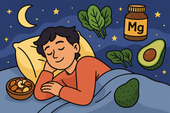
The Role of Magnesium for Night Cramps
Night cramps keeping you awake? Discover how magnesium helps relax muscles, balance electrolytes, and prevent painful spasms. Learn which forms work best, how to take them, and how to pair them with other nutrients for cramp-free, peaceful sleep.
-

Nootropics That Promote Calm and Rest
Explore the world of calming nootropics — natural brain enhancers that promote relaxation, better focus, and deeper rest. Learn how L-Theanine, magnesium, ashwagandha, and other adaptogens help balance your nervous system, reduce stress, and support restorative sleep.
-

Best Natural Supplement Stack for Sleep
Discover the best natural supplement stack for deep, restorative sleep. Learn how nutrients like magnesium, L-theanine, glycine, and calming herbs such as chamomile and ashwagandha work together to relax your body, calm your mind, and improve sleep quality—naturally and safely.
-

Combining L-Theanine and Magnesium for Sleep: A Calm Night, Naturally
Discover how combining L-Theanine and Magnesium can help you drift into deep, restorative sleep. Learn how this natural duo calms the mind, relaxes the body, and supports your nervous system—without grogginess the next morning.
-

How to Sleep Better After Intense Workouts
Struggling to fall asleep after a tough workout? Learn how to optimize your post-training recovery with nutrition, hydration, and science-backed sleep strategies. Discover how to calm your nervous system, balance hormones, and wake up fully recharged for your next session.
-

Ashwagandha and Valerian: A Bedtime Combo for Deep Rest and Emotional Reset
Discover the calming synergy of Ashwagandha and Valerian root, two natural sleep aids that help quiet the mind, ease anxiety, and promote deeper rest. Learn how this herbal duo supports the nervous system, balances stress hormones, and restores emotional peace — without next-day grogginess.
-

How to Create a Resilience-Boosting Diet
Discover how to build emotional and physical strength from the inside out with a resilience-boosting diet 🍎. Learn which foods stabilize your mood, how supplements like magnesium and omega-3s strengthen your stress response, and why pairing nutrition with breathwork and therapy creates lasting calm, focus, and vitality 🌿💪.
-

Best Teas and Herbal Blends for Calmness: Nature’s Way to Restore Inner Peace
Ashwagandha, the ancient adaptogenic herb, helps your body find balance during stress. Known as “Indian ginseng,” it supports cortisol regulation, boosts energy, and restores calm clarity. Discover how this powerful root promotes resilience, emotional balance, and steady vitality — one cup at a time. 🌸
-

Parenting and Emotional Strength: How to Raise Children Without Losing Yourself
Empathy is the bridge that connects hearts — the quiet power to understand, feel, and support another’s emotions without judgment. Learn how empathy strengthens relationships, enhances communication, and cultivates deeper compassion in everyday life. 🌿
-

How to Bounce Back from Public Failure: Reclaiming Confidence, Purpose, and Power
Visualization is more than imagination — it’s brain training for resilience. By picturing calm, success, or healing, you activate the same neural pathways as real experience. Learn how daily visualization rewires your brain for confidence, emotional balance, and recovery from stress. ✨
-

Coping with Financial Stress Through Resilience: How to Stay Grounded When Money Feels Tight
Body awareness is the foundation of emotional resilience. By tuning into your body’s signals — tension, fatigue, or calm — you learn to recognize stress before it overwhelms you. Discover how mindfulness, gentle movement, and breathwork can deepen your connection with your body and restore balance from the inside out. 🧘
-

How to Stay Positive During Chronic Illness: A Guide to Emotional Strength and Hope
Creativity is more than art — it’s a form of healing. Whether through painting, writing, music, or small acts of expression, creativity helps release emotion, calm the nervous system, and reconnect you to joy. Discover how to use creativity as a tool for emotional balance, resilience, and self-discovery. 🌿
-

Resilience Tips for Caregivers: How to Stay Strong While Caring for Others
Joy isn’t the absence of pain — it’s the quiet strength to find light even in challenging times. Cultivating joy through small daily moments restores balance, releases stress, and reminds you of life’s beauty. Learn how to reconnect with authentic happiness, rebuild emotional energy, and nurture your nervous system through gratitude, presence, and play. 🌿
-

Building Resilience After a Breakup: How to Heal, Rebuild, and Rise Stronger
Social connection is one of the strongest predictors of emotional resilience. During difficult times, genuine relationships act as anchors — calming the nervous system, reducing stress hormones, and helping you regain perspective. Learn how cultivating real human connection can strengthen your mind, heart, and overall well-being. 🌿
-

How to Stay Emotionally Strong During Job Loss
Your emotions are powered by brain chemistry — a delicate balance of neurotransmitters like serotonin, dopamine, and cortisol. When these chemicals work in harmony, you feel calm, focused, and resilient. Learn how daily habits, nutrition, and mindfulness can support your brain chemistry and boost emotional well-being naturally. 🌿
-

The Role of Hormones in Emotional Stability: How Your Chemistry Shapes Your Calm
Hormones shape more than your body — they shape your emotions, resilience, and sense of calm. From cortisol to serotonin, these chemical messengers influence how you react to stress, connect with others, and recover from challenges. Learn how to balance your hormones naturally to build lasting emotional stability and harmony within. 💫
-

Mitochondria and Emotional Energy: The Cellular Power Behind Your Mood
Breathwork is one of the most powerful tools for emotional regulation and cellular balance. Through intentional breathing, you can calm your nervous system, increase oxygen flow to the brain, and even support mitochondrial energy. Learn how conscious breathing connects body and mind — transforming stress into presence and emotional strength. 🌿
-

Inflammation and Its Impact on Mood Resilience: The Silent Link Between Body and Mind
Inflammation doesn’t just affect the body — it impacts the mind. Chronic inflammation alters brain chemistry, depletes serotonin, and makes emotional recovery harder. Learn how calming inflammation through nutrition, mindfulness, and sleep can restore balance, resilience, and a renewed sense of emotional strength. 💫
-

How Antioxidants Protect Emotional Well-being: The Hidden Link Between Oxidative Stress and Mental Health
Antioxidants do more than protect your body — they defend your mind. By neutralizing oxidative stress, antioxidants support serotonin, dopamine, and brain energy pathways that keep you calm, focused, and emotionally balanced. Discover how foods like berries, green tea, and dark chocolate nourish your brain, boost mood, and strengthen resilience from the inside out. 🌿✨
-

The HPA Axis and Emotional Health: The Hidden Bridge Between Stress and Mind
Neuroplasticity — the brain’s ability to rewire and adapt — is the foundation of emotional healing and resilience. When you face stress, trauma, or change, your neural pathways can reshape themselves to support new patterns of calm, focus, and self-awareness. Learn how daily practices like mindfulness, therapy, and breathwork strengthen neuroplasticity to transform emotional pain into personal growth. 🌸
-

Why Cortisol Control Is Key to Resilience: Mastering Stress to Build Emotional Strength
Controlling cortisol — the body’s main stress hormone — is the secret to lasting resilience. When cortisol levels stay balanced, your mind becomes clearer, emotions steadier, and energy more sustainable. Learn how breathwork, mindset shifts, adaptogens, and daily rhythms can help you calm your stress response and build true inner strength. 🌞💪
-

Dopamine’s Influence on Motivation and Recovery: Reigniting Drive and Balance
Healthy relationships are the foundation of emotional balance and resilience. Whether romantic, familial, or platonic, genuine connection releases dopamine, serotonin, and oxytocin — the brain’s “bonding trio” — helping us feel secure, motivated, and seen. Learn how trust, empathy, and communication not only strengthen your connections but also reshape your nervous system for deeper emotional well-being. 🌿🤝
-

The Role of Serotonin in Resilience: How This “Mood Molecule” Shapes Emotional Strength
Serotonin — often called the “resilience molecule” — plays a vital role in how we handle stress, regulate mood, and recover from emotional challenges. Beyond happiness, this powerful neurotransmitter helps balance the gut-brain axis, stabilize the nervous system, and support emotional flexibility. Learn how nutrition, sunlight, mindfulness, and adaptogens can naturally boost serotonin and strengthen your emotional resilience. 🌞🧠
-

How Neuroplasticity Supports Emotional Growth: Rewiring the Brain for Resilience
Neuroplasticity is the brain’s built-in power to grow, adapt, and heal — and it’s the foundation of emotional transformation. Every mindful breath, compassionate act, or reframed thought strengthens new neural pathways that support resilience and self-awareness. Learn how your brain rewires through daily habits, helping you turn emotional challenges into opportunities for growth and calm. 🌿
-

Tai Chi and Adaptogens for Mind-Body Balance: The Art of Harmonizing Energy and Resilience
Alchemy isn’t just an ancient science — it’s a timeless symbol of transformation and inner balance. By blending the physical and spiritual, alchemy teaches us that change begins from within. Just as metals are refined into gold, we too can transmute emotional pain, stress, and chaos into clarity and strength through mindful practice and self-awareness. 🌙✨
-

Cold Therapy and Emotional Control: Training the Mind Through the Body
Cold therapy isn’t just for athletes — it’s a tool for emotional mastery. By exposing your body to controlled cold, you train your nervous system to stay calm under stress, improving focus, mood, and resilience. This article explores the science of cold exposure, its impact on hormones and the vagus nerve, and how ice baths and cold showers can help you build emotional control, one breath at a time. 🧊🧘♂️
-

How Music Influences Emotional Recovery: The Healing Soundtrack of the Mind
Neuroplasticity — the brain’s ability to rewire and heal itself — is at the heart of emotional recovery. Through mindful habits, music, therapy, and consistent mental stimulation, your brain can form new connections that support resilience and well-being. Discover how neuroplasticity turns pain into growth, helping you rebuild balance, focus, and emotional strength. 🌿
-

Nature Therapy for Building Resilience: Reconnecting With the Healing Power of the Earth
Nature therapy helps rebuild emotional resilience by reconnecting you with the healing rhythms of the Earth. From forest walks to sunlight exposure, nature restores balance to your nervous system, lowers stress hormones, and teaches emotional adaptability. Learn how spending time outdoors can enhance mental clarity, calm anxiety, and awaken your natural capacity to heal. 🌞
-

Breathwork Techniques That Pair with Supplements: The Ultimate Synergy for Stress Relief and Mental Clarity
Breathwork and supplements create a powerful mind-body synergy for stress relief, focus, and energy. By combining intentional breathing with adaptogens, nootropics, and calming nutrients, you can naturally regulate cortisol, sharpen mental clarity, and boost emotional balance. This guide explores the best breathwork techniques and supplement pairings to help you feel centered, calm, and energized from the inside out. 🌿
-

Why Cortisol Balance Matters for Emotional Strength
Balancing cortisol — your body’s main stress hormone — is essential for emotional resilience. When cortisol is chronically high, your mind stays stuck in survival mode, leading to fatigue, anxiety, and emotional instability. This article explores how nutrition, supplements, breathwork, and therapy can help restore healthy cortisol rhythms, regulate the nervous system, and strengthen your ability to handle life’s challenges with calm focus and emotional strength. 🌿
-

Best Supplements for Students During Exam Season: Focus, Energy, and Memory Support
Studying late into the night? Learn which natural supplements can boost focus, memory, and mental stamina during exam season — without the crash. From omega-3s to Bacopa and Rhodiola, discover your brain’s ultimate exam support stack. 🎓🧠
-

Natural Memory Boosters for Seniors: How to Keep Your Mind Sharp and Focused
Stay mentally sharp and confident as you age. Discover science-backed natural supplements and lifestyle habits that boost memory, focus, and brain longevity for seniors. 🌿🧠
-

The Link Between Stress, Cortisol, and Memory Loss
Chronic stress can quietly erode your memory — and cortisol is the key culprit. Learn how stress hormones affect the brain, why the hippocampus shrinks under pressure, and how natural strategies can help you restore memory and mental clarity. 🧠✨
-

How to Build a Daily Supplement Routine for Memory Health
Want to sharpen your memory and stay mentally clear? Learn how to build a daily supplement routine for memory health — from morning focus to nighttime brain repair. Discover science-backed nutrients that boost recall, focus, and long-term cognitive resilience. 🧠🌿
-

Top 5 Natural Supplements for Memory Recall and Focus
Looking to boost memory and concentration naturally? Discover the top 5 supplements — Bacopa, Ginkgo Biloba, Lion’s Mane, Rhodiola, and Phosphatidylserine — that enhance focus, recall, and long-term brain health. 🧠✨
-

Top Supplements to Balance Mood Naturally
From omega-3s to adaptogens, discover the top natural supplements proven to support emotional balance, reduce stress, and promote inner calm — safely and effectively. 🌿✨
-
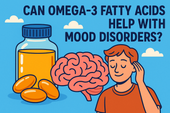
Can Omega-3 Fatty Acids Help with Mood Disorders?
Omega-3 fatty acids do more than support heart health — they can help balance mood, reduce depression, and calm anxiety. Discover how EPA and DHA nourish your brain, fight inflammation, and support emotional well-being from within. 🌊🧠
-

Vitamin D and Mood: The Sunshine Vitamin for Emotional Balance
Could the key to emotional balance be as simple as a little sunlight? Discover how vitamin D — the sunshine vitamin — influences serotonin, reduces inflammation, and helps you feel more positive and resilient year-round. ☀️💛
-

The Role of Magnesium in Reducing Irritability and Low Mood
Feeling on edge or emotionally drained? Magnesium could be the missing link between your body and your mood. Discover how this essential mineral reduces irritability, balances neurotransmitters, and helps your nervous system find calm again. 🌿✨
-
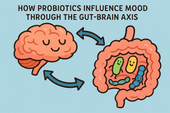
How Probiotics Influence Mood Through the Gut-Brain Axis
Discover how probiotics can do more than support your digestion—they can actually uplift your mood. This article explores the fascinating gut-brain axis and how balancing your gut bacteria through probiotics may help reduce anxiety, improve emotional stability, and support long-term mental well-being. 🌿🧠
-
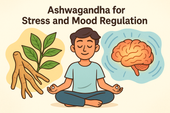
Ashwagandha for Stress and Mood Regulation
Discover how Ashwagandha, the powerful adaptogenic herb 🌿, helps your body manage stress and regulate mood. Learn how it balances cortisol, boosts GABA and serotonin, and supports emotional stability — helping you feel calm, focused, and resilient every day.
-
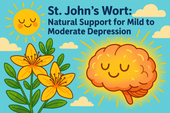
St. John’s Wort: Natural Support for Mild to Moderate Depression
Discover how St. John’s Wort, the “sunshine herb” 🌼, naturally supports mild to moderate depression. Learn how it boosts serotonin, balances mood, and promotes emotional resilience — with research showing its effectiveness compares to antidepressants, but with fewer side effects.
-
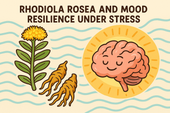
Rhodiola Rosea and Mood Resilience Under Stress
Discover how Rhodiola rosea helps your body adapt to stress 🌿. Learn how this powerful adaptogen balances cortisol, supports serotonin and dopamine, and strengthens emotional resilience — helping you stay calm, focused, and energized under pressure.
-

Chamomile and Lavender: Herbal Calm for Emotional Fluctuations
Discover how chamomile and lavender bring calm to emotional ups and downs 🌿. Learn how these two soothing herbs balance your nervous system, ease anxiety, and support restful sleep — naturally helping you find peace and emotional stability.
-
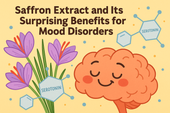
Saffron Extract and Its Surprising Benefits for Mood Disorders
Discover how saffron extract — the golden spice of joy 🌸 — can naturally support mood balance, ease anxiety, and lift mild depression. Learn what science says about its serotonin-boosting power, the ideal dosage, and how this ancient remedy compares to modern antidepressants.
-
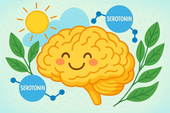
5-HTP and Serotonin: A Natural Path to Lifting Mood
Discover how 5-HTP naturally boosts serotonin 🌞 — the neurotransmitter behind mood, sleep, and emotional balance. Learn how this plant-derived compound supports happiness, reduces anxiety, and improves rest by helping your brain create more serotonin the gentle, natural way.
-
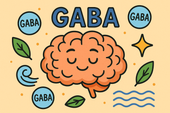
GABA Supplements for Reducing Anxiety and Mood Swings
Discover how GABA supplements can help reduce anxiety and balance mood naturally 🌿. Learn how this calming neurotransmitter works to quiet the mind, ease stress, and improve sleep — plus which nutrients and habits can boost your body’s own GABA production for long-term emotional stability.
-
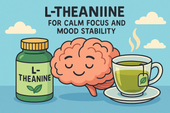
L-Theanine for Calm Focus and Mood Stability
Discover how L-theanine, the calming compound found in green tea 🍵, promotes focus, relaxation, and mood stability. Learn the science behind how it balances neurotransmitters, reduces stress hormones, and enhances clarity — helping you stay centered, calm, and productive without sedation.
-
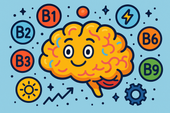
B Vitamins and Brain Chemistry: Supporting Energy and Emotional Balance
Discover how B vitamins power your brain chemistry ⚡. Learn how B6, B9, and B12 support serotonin, dopamine, and energy production — helping boost focus, mood, and emotional balance. From diet to supplements, explore how this vital nutrient group keeps your mind resilient and your energy steady.

















































